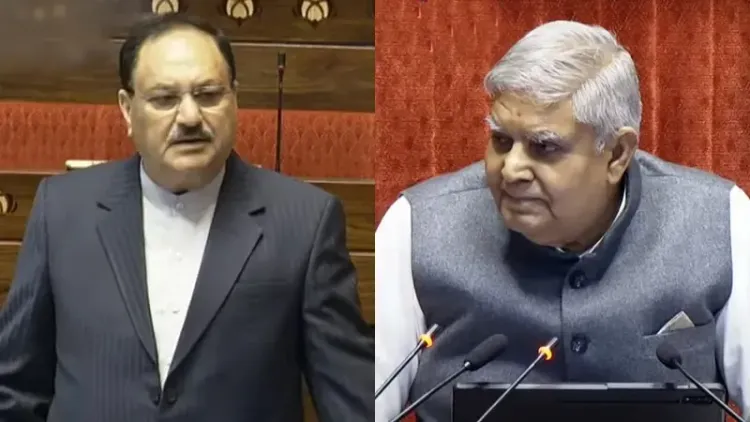Nadda Labels Opposition Walkout as Tool for Anti-National Activity

Synopsis
Key Takeaways
- Nadda criticizes Opposition for walkout.
- Claims walkout is anti-national activity.
- Demands suspension of dissenting MPs.
- Rajya Sabha Chairman expresses disappointment.
- Waqf Bill aims for reforms in property management.
New Delhi, Feb 13 (NationPress) As the Opposition orchestrated a walkout in protest against the JPC report on the Waqf (Amendment) Bill, Leader of the House J.P. Nadda called for stringent action against the dissenting members, labeling their actions as a "tool and motivation for anti-national activities."
Nadda vehemently criticized the Opposition's walkout, contending that the Chairman had offered sufficient opportunities for them to voice their opinions. "All their points were presented properly," he stated.
Condemning the Opposition's actions, Nadda claimed that their aim was not to engage in discussion but to gain political leverage.
"The Parliamentary Affairs Minister has clearly indicated that nothing has been deleted and everything is included in the annexure. The Opposition's conduct was profoundly irresponsible and must be condemned. This is appeasement politics," he asserted.
Nadda further alleged that certain elements were conspiring against the Indian state, stating, "This Opposition walkout should be recognized as a tool and motivation for anti-national activities. The Opposition is empowering anti-national forces," he claimed.
Demanding decisive measures, Nadda urged the Chairman to suspend the Opposition MPs who had exited the session.
Previously, Rajya Sabha Chairman Jagdeep Dhankhar expressed dismay, emphasizing that there was no justification for members to neglect their constitutional responsibilities.
"What truly troubles me is that I provided a full opportunity for the Opposition to present its stance. There is no reason for them to abandon their constitutional duty. They are not merely walking away from the House," Dhankhar stated.
He added that the entire nation was concerned about the Waqf issue and was looking to Parliament for a resolution.
As Thursday's session unfolded, the Opposition intensified its protests against the motion to adopt the report of the Joint Committee on the Waqf (Amendment) Bill, 2024. Earlier in the day, the bill was introduced amidst chaos, and a motion was proposed to record evidence related to it.
The Leader of the Opposition in the Rajya Sabha, Mallikarjun Kharge, vehemently opposed the report, deeming it "unconstitutional" and "fake." He argued that numerous members had submitted dissent notes, yet the majority opinion was imposed without fair consideration.
Union Parliamentary Affairs Minister Kiren Rijiju countered these claims, accusing the Opposition of misleading the discussion. He asserted that no part of the report had been deleted or modified.
"Some concerns raised by the Opposition were verified, and I found that no section of the report was removed. Everything has been presented before the House. On what basis are these allegations being made? Do not mislead the issue," Rijiju stated, dismissing the allegations as unfounded.
He also highlighted that the Opposition had actively participated in drafting the report over the past six months.
Jagdambika Pal, BJP MP and Chairman of the Joint Parliamentary Committee (JPC) for the Waqf (Amendment) Bill, previously mentioned that the committee was presenting its report following extensive consultations.
Pal emphasized that differing opinions are a natural aspect of the legislative process. He noted that even after the report's finalization, dissenting members were invited to submit their notes of dissent, which were included in the final documentation alongside stakeholder feedback.
The Waqf Act of 1995, enacted to regulate Waqf properties, has faced long-standing criticism for mismanagement, corruption, and illegal encroachments. The Waqf (Amendment) Bill, 2024, aims to address these issues through reforms such as digitization of records, improved auditing mechanisms, greater transparency, and legal measures to reclaim unlawfully occupied properties.










